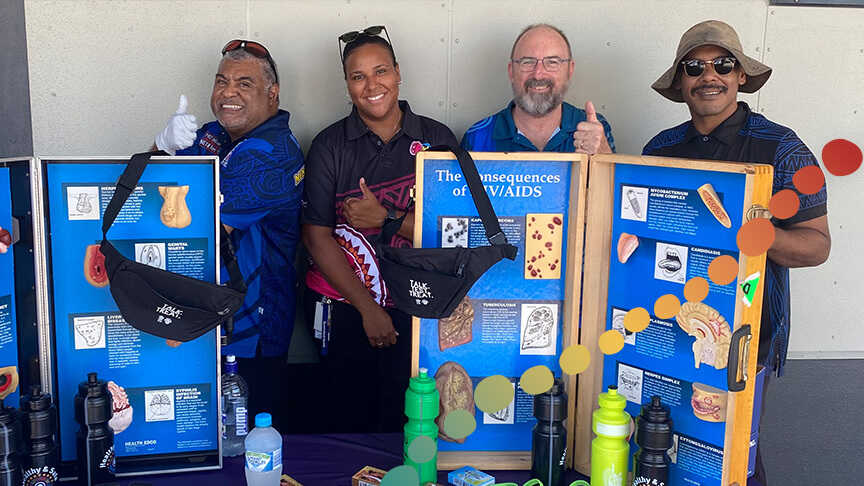
Raising awareness: The Men’s and Women’s Health Promotion Team (North) – from left Richard Mola, Chenoa Wapau, Richard Hayes, and Tyrome Zitha.
Health authorities in the Torres Strait were kept busy last month promoting Sexual Health Awareness Month which is observed during April. Torres and Cape Hospital and Health Service Thursday Island-based Men’s and Women’s Health Clinical Coordinator Sandra Gregson said activities included radio promotions, along with community barbecues and information stalls. “Key messages and information delivered included reducing sexually transmissible infectionrelated stigma, fear, and discrimination,’’ she said. “We wanted Torres Strait residents to take the opportunity during April, and beyond, to consider their risks and take appropriate precautions.’’ Ms Gregson said the rate of sexually transmissible infections (STIs) including chlamydia, gonorrhoea and syphilis had climbed state-wide and nationally over the past 20 years. “Notifications of infectious syphilis (4 cases to date) in the overall Torres and Cape Hospital and Health Service region are on a par with previous year to date numbers, even a bit lower,’’ she said. “However, we have seen increases in notifications of chlamydia (289 cases this year to date compared to 178 for the same period last year) and gonorrhoea (88 cases to date compared to 63 for the same period last year), similar to the state-wide and national increases in notifications for these conditions. “As elsewhere in Queensland and nationally, this is thought to be partly attributed to advances in diagnostic technology and increased testing. “But it is also linked to increases in the use of dating apps and greater access to more sexual partners.’’ Senior Public Health Officer Mario Assan said ensuring people had the tools and knowledge for prevention, testing and treatment options was really important. “The best way to prevent getting an STI is to use condoms with water-based lubricant,’’ he said. “Condoms, if used correctly, are the most effective way to reduce the risk of contracting an STI whilst also helping to prevent pregnancy.’’ Torres Strait Program Coordinator Lily-Annie Ahmat said one of the main aims of Sexual Health Awareness Month was to promote and provide factual sexual health and relationships information. “Having regular sexual health checks is also an important part of maintaining good sexual and relationship health,’’ she said. “Many STIs do not have symptoms, so the only way to know if you have an STI is to have a sexual health check, including STI testing. “For most sexually active people, it is recommended to get tested at least once a year, but there are situations where getting tested more regularly is advised. Read more about Sexually transmissible infections. |